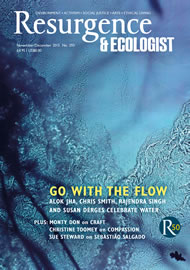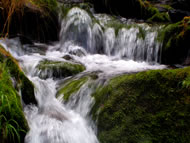William Wordsworth’s great poem about his own life, The Prelude, begins with him speaking about the river Derwent, which ran at the foot of the garden behind the house where he was born, in Cockermouth, in the Lake District. He writes about how the river “lov’d to blend his murmurs with my nurse’s song”,
And from his fords and shallows, sent a voice
That flow’d along my dreams…
How remarkable it is, in a way, that he opens a major poem about his own life, mind, thought and experience, with a river. It serves to remind us, perhaps, of the importance that rivers have for all of us. How we depend on them. How we value them. How we need to respect them. And how, increasingly, we need to nurture them – and the water they deliver to us – with care and attention.
I remember the river Derwent all too well in another guise, back in December 2009, when as Chairman of the Environment Agency I went up to Cockermouth to see the river in wild spate, surging way over its banks, flooding half the town, including Wordsworth’s house, and carrying trees, rocks, bridges, banks and roadway away in its wake. No blending murmurs or fords and shallows then.
And this, I’m afraid, is something we are going to have to learn to cope with and prepare for more and more into the future: the increasing extremes of weather and rainfall that will come with climate change. We are going to see more floods and more droughts. We are going to see rivers surging way beyond their banks at some times and drying to a trickle at others. And we are going to have to get better at understanding water and how we can and should handle it.
Our rivers and their water serve four principal purposes. They provide us with water in our homes, for drinking, cooking, washing and keeping clean. They provide agriculture with the water needed to grow crops and keep land fertile. They provide business and industry with water for industrial processes. And, crucially, they sustain a water ecology that is fundamental to the biodiversity and sustainability of the natural world we all depend on.
As we increasingly face the impacts of climate change, we are going to have to learn how to balance these sometimes competing demands on our rivers and water. Some things, however, will not be a matter of balance. They will be more important than that. And the protection of the water ecology and its survival into the future must, I believe, become one of those more important things.
I don’t think we yet understand, as a society, how vital and fragile our water actually is. For far too long we’ve just assumed that it somehow falls out of the sky and then magically comes out of the kitchen tap. We tend to regard it as an infinitely available free resource. The fact that we need to source it, secure it, manage it, treat it, deliver it and sometimes conserve it rarely enters anyone’s head. I believe we have a major educational task here, to ensure that people everywhere come to see water for the precious and ultimately limited resource it is.
Here in Britain we use around 150 litres of water per person per day. That’s too much. In Germany it’s around 115 litres. We need to get better at conserving water. At using less of it. At making products that are more water-efficient. At building cities and buildings that reuse more and are designed more sustainably. At finding new innovative processes, materials and services that can help not only our water challenges but those around the world too.
And above all we need to rediscover the Wordsworthian sense of how water and rivers are at the heart of everything. And at the very start of all our lives.








